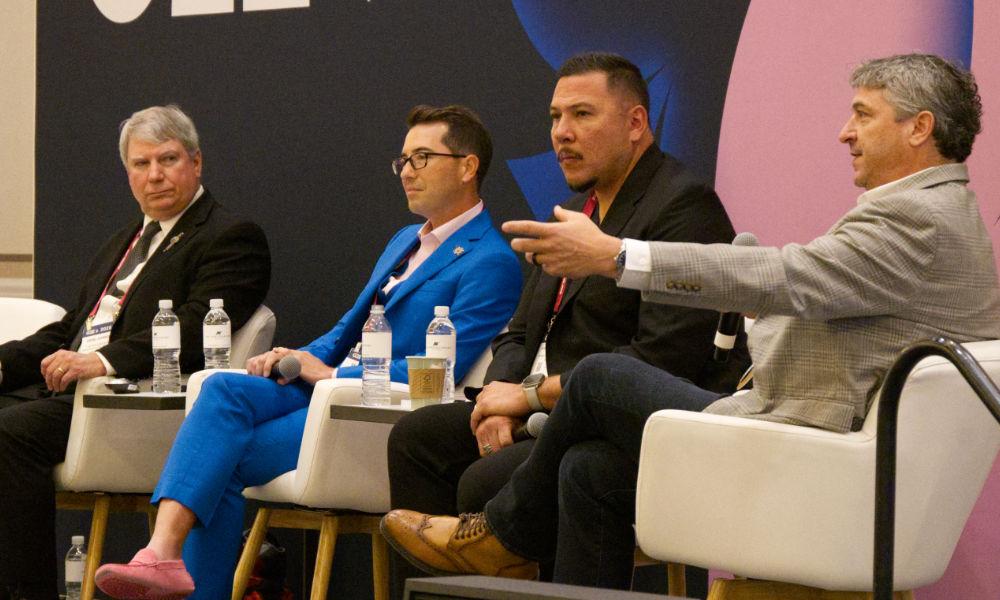Igaming in Michigan has been a greater success than expected, panelists at Global Gaming Expo agreed. But that doesn’t make it a template for other states, they cautioned.
“From Reservation to Regulation: How Michigan Tribes Entered Online Gaming” was the topic at hand. It was chaired by Oklahoma attorney Elizabeth L. Homer.
Gene Johnson of Victor Statistics led off, tracing the upward trajectory of igaming in the Wolverine State. It was legalized in December 2019, with 15 licenses awarded and a tax rate varying from 20 percent to 28 percent.
“It exploded out of the gate,” Johnson recalled, “and the growth is continuing.” Online sports betting (OSB), he added, has proven much more volatile than igaming. It is, he said, “more like table games than slots. You can lose money.”
Igaming isn’t as dominated by FanDuel and DraftKings, Johnson continued, with customers showing more brand loyalty to brick-and-mortar casinos. Online gambling, he said, “has rocketed up to $2 billion, but it hasn’t destroyed land-based gaming.”
“Just because it works for Michigan doesn’t mean it works for every state. Every state is a snowflake,” cautioned Brandt Iden, vice president of governmental affairs at Fanatics. As a Michigan legislator, Iden was the moving force behind the state’s legalization of igaming and OSB.
Michigan, Iden continued, was a win-win-win for the state, operators, and consumers. He made a point of consulting with all the state’s 12 Native American tribes when crafting his legislation, a six-year process that spanned two governorships.
The state’s model works, Iden said, because of igaming, whereas OSB creates winners and losers. For that reason, he thought sports betting problematic for Oklahoma and California, where there are many more tribes and OSB is the leading edge of digital gambling.
Aaron Schlehuber, an attorney for the Prairie Island Indian Community, noted that the larger OSB providers wanted different legislation than what they got. Also, the tribes “were on very different pages and it wasn’t a concerted effort.” Some tribes pushed for igaming, others held back. Once passage became imminent, tribes started “speed-dating” prospective operators. Facing genuine industry interest, they coalesced.
Although admittedly new to the market, with five months under his belt at Soaring Eagle Casino, CEO Joe Nayquonabi offered some of the audience’s favorite remarks on the topic of Michigan. “We’re used to these really romantic stories” about tribal gaming, he said, recalling the days when bingo games were called over AM radio and a “bingo” was signified by honking one’s car horn. “We’ve gone from that to the biggest [igaming] market share in Michigan. It’s this remarkable tale.”
From his perspective, being relatively newly arrived from Minnesota, six years of legislative activity was a brief timespan. Nayquonabi contrasted that with the Gopher State where, after four or five years of lobbying for OSB, the matter was far from resolved. He added that the speed-dating process was a huge lesson. “If you go to the dance with FanDuel, with DraftKings, your tribe will be sitting pretty good. Your community will be changed forever.” But without one of the bigger players as partner, one’s attractiveness at the dance diminishes rapidly, “Avoid the speed dating,” he advised. “Try to get your partnership early.”
For its part, Soaring Eagle avoided a partnership altogether, going it alone as a “white-label” provider. Some Michigan tribes, it was noted, linked themselves to smaller operators who have since fled the market, leaving them high and dry.
White-label branding, Nayquonabi resumed, wasn’t as risky as it sounded. Secondary business-to-business providers were coming in a second wave now, offering improved products for stand-alone operators. “People are gonna have to go white label,” he advised, “and things are getting better from that standpoint.”
One of the upsides to going white label, panelists explained, was that tribes don’t have to settle for a small portion of revenue in return for partnering with a brand name. “If you go with a B2C provider, you can quickly enter the market” and don’t have to hire staff, Johnson said. However, the downside is that you don’t have access to your partner’s database, in addition to settling for a sliver of the revenue. “You should build a financial model,” Nayquonabi advised tribes, “and just keep toggling it.”
When it comes to regulation, panelists concurred that Michigan has one of the most active, but positive operator-regulator, relationships. Johnson cited its high level of pushback against offshore igaming operators, while Schlehuber agreed that the Michigan Gaming Control Board was “absolutely on it.”
Tribal regulators, he continued, were initially “terrified” by igaming, at least when it was new to them and they were confronted with a raft of unfamiliar technologies. “They had a very very heavy lift,” Schlehuber said, but are now a good model for other states contemplating igaming. Indeed, moderator Homer contrasted Michigan’s comity favorably with the fractious tribal-gubernatorial relationship in her native Oklahoma.
Iden stressed that the Michigan model works only due to a limited amount of tribal sovereignty being ceded, in order to partner with the private sector and allow taxation by the state. “I had to get tribal leaders to believe this was a model that works for them,” a process that took two summers to achieve.
The clincher, Iden continued, was to liken it to the partial sovereignty waiver that allows for liquor sales on reservation land. “It all comes down to a glass of bourbon,” he joked.
Nayquonabi praised Michigan’s foresight in pivoting to igaming. He observed that his brick-and-mortar casino patrons were getting older and “we’re going to have to find growth.”
Another sign of maturation of igaming is that casinos are nearing the point when their six-year window for deduction promotional outlays closes. Offered Iden, “I’d be happy to amend that.”
Panelists were queried whether igaming was accessible purely through the internet. It is, or as Johnson put it, “Not like Nevada.” Cried one audience member, “Ouch!”



